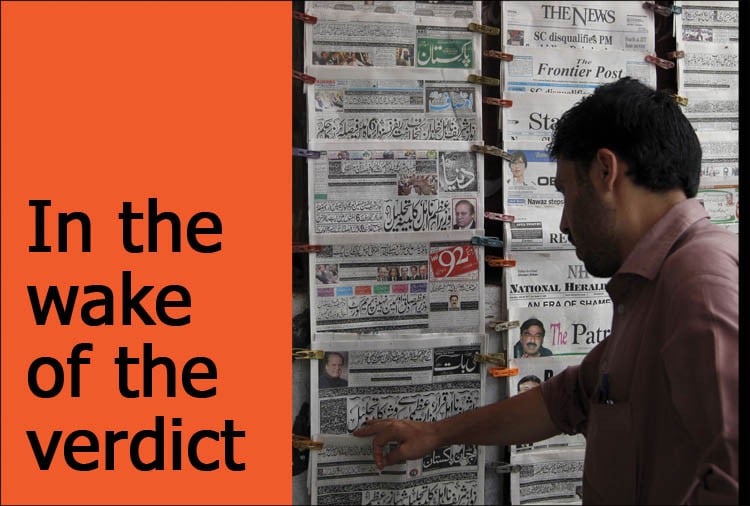

Mian Mohammad Nawaz Sharif, the prime minister of this country till last week, has been shown the door by the Supreme Court. However, the debate about and around his ouster has not ended yet. The sweet shops may have run out of their fare on July 28 but the saner sections of society were unanimous in calling it a "sad day". The political parties vying for his removal through the courts may have been over-joyed but a large section of the legal and political minds did not celebrate it as victory of the rule of law.
Broadly, there are three ways to look at the political situation that has emerged after the verdict of July 28, even though they do miss the nuances that afflict our polity.
First is to look at the person of the prime minister in order to consider his own share of responsibility in the state of affairs. This narrative, that sees an elected prime minister’s ouster in this manner as a blow to democracy, also questions Nawaz Sharif’s democratic credentials with specific reference to his governance model. Since he and the party he represents had weakened the parliament, they did allow other institutions a chance to intervene and push them out. The strength of democracy does not lie in allowing people to elect their rulers; it lies in allowing people to change them. The outgoing prime minister and his party, on the other hand, were believed to have captured the system in a way that there was no way to oust them, not even through elections.
So should we then say that the verdict of July 28 was justified?
This is where the second critique of the political situation lies -- in evaluating the legal course adopted by the apex court as well as the judgment itself. Even though nobody believes the first family had not used its political clout to multiply its fortunes, mostly by unfair means, there are serious objections to how the courts dealt with the matter. The dispensation of justice in this case is largely seen as hurried, selective and problematic on so many counts.
Read also: In the wake of the verdict
To summarise the verdict on the judgment: it will not put an end to corruption of the political class or otherwise; it has set a bad precedent where an unelected institution has overreached its jurisdiction to punish the elected representatives; and it will weaken democracy in the ultimate analysis.
The third and last part of the narrative sees the current political climate in the light of the civil-military imbalance of power which remains the central and defining tension of our polity. Thus, Nawaz Sharif was made to pay the price for asserting the civilian supremacy vis-à-vis Pakistan’s relations with India and other foreign policy matters and not for the financial corruption of his immediate family. As per this narrative, it is another elected civilian prime minister whose tenure has been cut short at the behest of unelected forces in order to weaken the cause of democracy.
It is now a challenge for the political forces to turn the uncertain and fragile situation into an advantage. The best course perhaps is for them to come together and seek a solution from within the parliament and put in place workable and credible systems of democratic accountability.